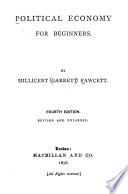 | 1851 - 616 lapas
...Such a first principle he finds in the following definition of justice : " Every man has freedom to do all that he wills, provided he infringes not the equal freedom of any other man." This, he says, is the sole law of the social relationship : whatever action or institution respects... | |
 | Herbert Spencer - 1851 - 492 lapas
...unequal rights. §8. Thus to the several positive reasons for affirming that every man has freedom to do all that he wills, provided he infringes not the equal freedom of any other man, we must now add the foregoing negative ones. Neither of the alternatives, to which the rejection... | |
 | John Chapman - 1852 - 112 lapas
...itself, Mr. Spencer, after summing up the evidence, finally states it to be, that " Every man has freedom to do all that he wills, provided he infringes not the equal freedom of any other man:" adding, that " though further qualifications of the liberty of action, thus asserted, may be... | |
 | Henry Allon - 1851 - 604 lapas
...this matter, we are alike taught as the law of social relationships, that every man has freedom to do all that he wills, provided he infringes not the equal freedom of any other mem. Though further qualifications of the liberty of action thus asserted may be necessary, yet we... | |
 | Herbert Spencer - 1868 - 544 lapas
...widelydifferent things. To enforce the fundamental law to take care that every man has freedom to do all that he wills, provided he infringes not the equal freedom of any other man this is the special purpose for which the civil power exists. Now insuring to each the right... | |
 | Joel Moody - 1871 - 358 lapas
...liberty of each, limited only by the like liberty of all; and say with Spencer: " Every man has freedom to do all that he wills, provided he infringes not the equal freedom of any other man," then, it is no wrong for him to injure himself nor any animal belonging to himself; whereas,... | |
 | Charles Hodge, Lyman Hotchkiss Atwater - 1861 - 866 lapas
...called in the title of the book, first condition of human happiness, is that Every man has freedom to do all that he wills, provided he infringes not the equal freedom of any other man; and his whole book is professedly devoted to prove and develope this principle. He thinks he has... | |
 | 1885 - 900 lapas
...unavoidably follows that they have equal rights to the use of this world. For if each of them ' has freedom to do all that he wills, provided he infringes not the equal freedom of any other,' then each of them is free to use the earth for the satisfaction of his wants, provided he allows all... | |
 | Dame Millicent Garrett Fawcett - 1876 - 364 lapas
...either prudent or imprudent, but it can never deserve censure as morally wrong. " Every one has a right to do all that he wills, provided he infringes not the equal freedom of any other person." If this moral law had always been observed by trades' unionists they would have deprived their... | |
| |